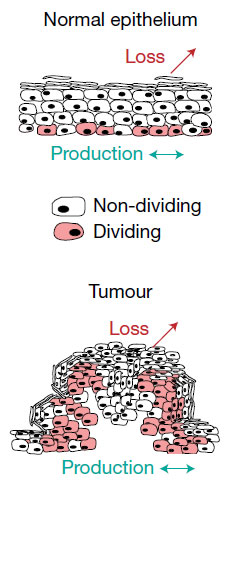How oesophageal cancers grow

The study, published in Nature Cell Biology, could lead to the development of new treatments for cancers that do not respond to current therapies which target fast-growing cells.
Normal cells produce equal numbers of dividing and non-dividing cells, a balance which sustains the tissue. For every 100 normal cells, 50 of them will divide and 50 of them will not. The researchers found that for 100 pre-cancer cells the balance was slightly skewed in favour of dividing cells, with 52 of those cells dividing and 48 remaining undivided. This is the first time this has been shown. The subtle shift loads the odds in favour of cell division and over time this can lead to tumour growth.
Oesophageal cancer is the sixth most common cause of cancer death in the UK. Each year 8,750 people are diagnosed with the disease, which is hard to treat even with aggressive therapy. Understanding the processes underlying tumour growth could help in the development of new cancer treatments.
“We created a new model of human squamous cancer of the oesophagus in mice, and measured the rate of cell division. In these mice all the cells in the body divided once per day, proving that precancerous and cancerous cells can divide at the same speed as surrounding normal cells. But the pre-cancerous cells produced a small excess of dividing over non-dividing cells – it was this marginal gain of cells that led to malignant tumours.”
Dr Philip Jones Lead researcher from the Wellcome Trust Sanger Institute
Tissues can naturally change the ratio of dividing versus non-dividing cells in response to certain events. For example, cells divide at the edge of a wound, but this imbalance in cell division stops once the wound has healed.
The scientists saw that in very early tumour tissue development, multiple different cells, each with different alterations in their DNA, came together to form a polyclonal pre-cancerous tumour. However, the researchers showed that as these various pre-tumour cells became cancerous, they evolved differently with some gaining an advantage by producing a greater proportion of dividing daughters. This led to a group of cells in the tumour that dominated and out-competed the other cells in the tumour.
“Our research showed that oesophageal carcinoma and possibly other hard-to-treat cancers may behave in a very similar manner to normal cells, rather than dividing more rapidly. This would explain why treatments such as radiation therapy that target fast-dividing cells don’t work with all cancers. More research is needed to find the mechanisms that drive the proportion of cells that divide.”
Dr Julia Frede A lead author from the Sanger Institute
“This study, carried out in mice, uncovered surprising evidence that unbalanced cell division is important in the development of a certain type of oesophageal cancer. The next important step will be finding out whether the same is true in patients with the disease. If scientists can unpick the biology causing the imbalance, then it may lead to new treatments for this hard to treat type of cancer and boost the number of people surviving.”
Dr Justine Alford Cancer Research UK’s science information officer
More information
About Oesophageal Cancer
- Oesophageal cancer is cancer of the foodpipe that carries food from your mouth to your stomach. The foodpipe is also called the oesophagus or gullet.
- Cancers in the upper part and middle part tend to be squamous cell carcinomas. These develop from cells that make up the inner lining of your oesophagus.
- 8,750 people in the UK are diagnosed with oesophageal cancer each year in the UK, and it is currently the sixth largest cause of cancer death worldwide
For more information please see: http://www.cancerresearchuk.org/about-cancer/oesophageal-cancer/about#UoEzTG1fU5uV1125.99
For any advice or to talk to a nurse, Cancer Research UK have a helpline at: 0808 800 4040
See: http://www.cancerresearchuk.org/about-cancer/utilities/contact-us/send-a-question/#folt4SoJF7vPxIDE.99
Funding
This work was funded by Cancer Research UK Programme Grant (C609/A17257), the Medical Research Council, the Wellcome Trust (grant number 098357/Z/12/Z), a DFG Research Fellowship and an EPSRC Critical Mass Grant.
Publications:
Selected websites
The MRC Cancer Unit
The MRC Cancer Unit forms part of the School of Clinical Medicine at the University of Cambridge. The Unit undertakes world-leading research into understanding how cancers develop, and seeks to translate this knowledge into new approaches for diagnosis and treatment that can be applied in the clinic. Its focus is on discovering the early steps in epithelial carcinogenesis, because better understanding of these steps will lead to new methods to improve the care and survival of patients with epithelial malignancies such as pancreatic, oesophageal, lung, breast and skin cancers.
The Wellcome Trust Sanger Institute
The Wellcome Trust Sanger Institute is one of the world’s leading genome centres. Through its ability to conduct research at scale, it is able to engage in bold and long-term exploratory projects that are designed to influence and empower medical science globally. Institute research findings, generated through its own research programmes and through its leading role in international consortia, are being used to develop new diagnostics and treatments for human disease.
The Wellcome Trust
The Wellcome Trust is a global charitable foundation dedicated to achieving extraordinary improvements in human and animal health. We support the brightest minds in biomedical research and the medical humanities. Our breadth of support includes public engagement, education and the application of research to improve health. We are independent of both political and commercial interests.


